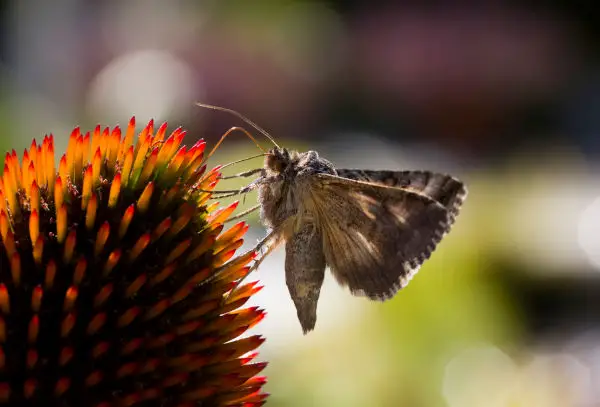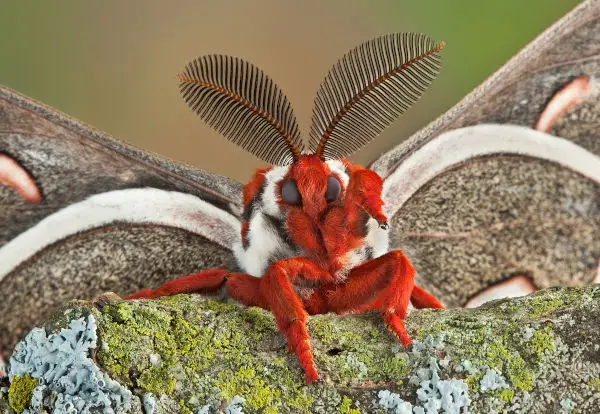Can a Bearded Dragon Eat a Moth? (Are they poisonous?)
If you are checking up on moths for your Bearded Dragon you are clearly looking for the best food for them (Click here to learn, from this guide, if you are feeding your beardie the wrong foods).
Can a bearded dragon eat a moth? No, Bearded Dragons should not be fed moths. This is because they offer limited nutritional benefits. Also, they may have diseases, parasites, or be poisonous.
| Are these foods dangerous for your Beardie? | |
| Avacado? Click here to learn, from this guide, if this food is dangerous |  |
| Superworms? Click here to learn, from this guide, if this food is dangerous |  |
Now that you know that I do not advise you to feed him moths. Keep reading to learn if this same rule applies for babies, other known risks with them, some weird benefits that they offer, and much more.
What is a moth?

Moth on a coneflower
Before we look deeper into the viability of moths as a food source for your Beardie. Let me explain exactly what a moth is. I understand that there is a good chance that you have an idea of what it is, right?
But, do you know what taxonomical family it belongs too, how many species are in existence, etc? If not, keep reading.
Classification
A mouth is a broad term for a group of insects that are part of the Lepidoptera order. If you have not heard of this term, “order”, before, let me explain. It is used in biology to rank animals. For example and order consists of many genus’s, and a genus can have many species, are you with me?
In this Lepidoptera order all of the species, except the butterflies are moths. To put this into perspective, there are over 160,000 of these species.
Moths that are relevant to the Lizard community
Considering the fact that there are over 160,000 species to consider, there is way too many to discuss in this article. Therefore, I will focus in on two, because they are often discussed in the lizard community, and I will explain why. They are:
- Wax moths
- Hawkmoths
In the next section I will explain a bit more about these two moths to help you understand if moths are a good choice for your Beardie.
What is a Wax Moth?
Following on from the last section, I will explain here exactly what is a wax moth. And, more importantly, what relevance this has to your Bearded Dragon.
A wax moth is a general name used for two moth species:
- Lesser Wax Moth
- Greater Wax Moth
Wax Moth’s Larval state
In the lizard community the Wax Moth is more commonly known in its larval form, Wax Worms. These wax worms are also known as:
- Webworms
- Bee millers
- etc
So, there is a chance that you may have heard of them called something slightly different. And, hopefully this has helped you to connect the dots.
These wax worms are used as a food source for some lizards. Much in the same way as Superwoms and Mealworms (Click here to learn more about these worms) are consumed.
What is a Hawk Moth?
As discussed earlier, the Hawkmoth is another one of the two moth species I mentioned earlier. These Hawkmoths are a family of moths known as Sphingidae. You may have heard of them called the following:
- Sphinx moths
- Hornworms (Their larval state)
The chances are you have heard of them in their larval state, Harnworms. This is because, like Superworms and Mealworms, they are often fed to lizards as a live food source.
Are there any benefits of moths?
By this stage, after understanding more about what moths are and how these moths and larvae fit into place, you may be wondering if there are any benefits of them as a food source. Let me explain.
Moths in their larval state as a food source
As a moth there are not many, if any benefits, as a food source. However, in their larval state they are often fed to Bearded Dragons and other lizards.
This does not mean that they are a good staple food source. The reality is, they have large levels of fat. And, for that reason they should be fed sparingly.
Indirect benefits in Nature
Another benefit of moths, much like bees, is their ability to pollinate flowers while they feed off their nectar. This pollination helps the flower and other plant-based food sources as well.
This benefit is indirect because Bearded Dragons consume vegetables and fruit, as well as insects. These vegetables and fruits benefit from the population process. This will, in turn, benefit your Bearded Dragon, are you with me?
Are there any negatives with eating moths?

A male cecropia moth is waving
Now that you know some of the benefits of moths, the chances are you will want to know what risks do they pose for your Bearded Dragon, right? Let me explain…
Some can be poisonous
One of the concerns with some moths is if they are poisonous. In most cases there is nothing to worry about. But, there are some exceptions. For example, the “death moth” is a species that uses cyanide and bright red spots to del with its predators.
The chances of your Beardie meeting one of these is quite slim to be fair, but if they are eaten, they can be quite dangerous.
There are other species that offer indirect threats. These particular species start off as larvae that are known to feed on poisonous plants. These poisons are known to be stored until an unwilling predator eats them. So, obviously, any Bearded Dragon would need to be kept away from them.
Parasites and other diseases
Another concern with these moths, in particular wild moths, is the unknown parasites or diseases they may be carrying. If your Bearded Dragon starts to snack on an infected moth, this could lead to him being sick, are you with me?
Should You Feed Your Bearded Dragon moths?
Now that you know the benefits and risks of moths you may be keen to understand if they should be considered or not. Let me explain…
To get to the point, no, I would not advise you to feed your Bearded Dragon moths. This is because of the fact that they offer very little nutritional benefit and have a risk of carrying parasites, disease, or poison. There are so many other nutritional foods for your Beardie (Click here to see which ones), so moths should not be a consideration.
Should a Baby Bearded Dragon be fed moths?
Now that you clearly know that I do not advise moths as a food source for your Beardie. You may be wondering if this same rule applies to a baby Beardie. The short answer is yes, the same rule applies. I do not advise feeding your baby Beardie moths.
This is mainly for the same reasons above. Also, with babies, you need to be even more careful, because they are so fragile. Are you with me?
Related Questions:
In this section I will answer some questions related to keeping your Bearded Dragon feed the right foods and improving his behavior. If you have any more questions feel free to contact me.
Q: Should Bearded Dragons eat really small insects?
No, small insects, in general, they are not an ideal food source for Bearded Dragons. Thye will attempt to eat almost anything you give them. However small insects like ants are not good for Bearded Dragons (Click here to see why). There may be others that serve as a better option, but in general, they are not regarded as a staple food source.
Q: Do Bearded Dragons really have Beards?
No, Bearded Dragons do not have real beards. Their name comes from the fact that their throat pouch gives the illusion of beard, are you with me? At a glance one would assume that they do have one, but in reality it is not actually a beard. They use this pouch in self-defence and for attracting their mate for breading.